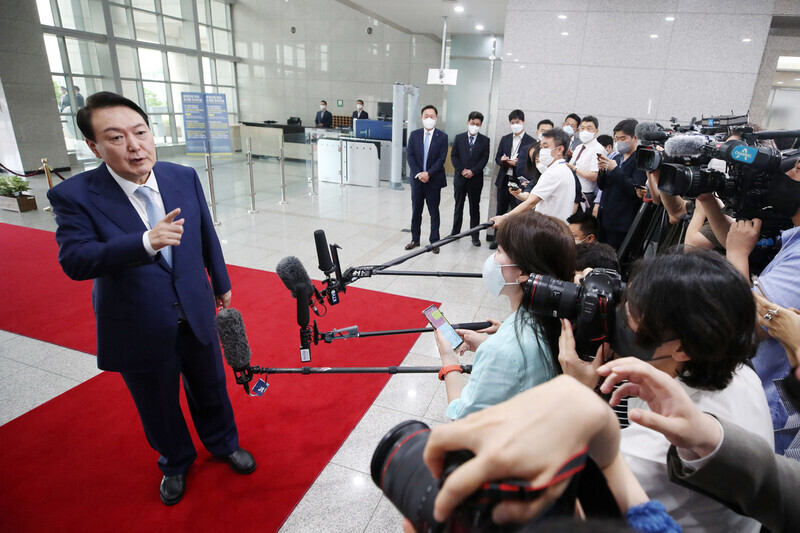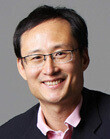hankyoreh
Links to other country sites 다른 나라 사이트 링크
[Column] Yoon Suk-yeol’s liabilities have started to catch up with him


Less than two months into his term, South Korean President Yoon Suk-yeol is facing a slipping approval rating. The message this sends is rather grim.
While he is right in saying that approval ratings tend to fluctuate, it’s unprecedented to see negative assessments of a president’s performance consistently outweighing positive ones or remaining more or less equal ever since he took office.
In the first year of his administration 14 years ago, then-President Lee Myung-bak’s approval rating plummeted below 30%. His decision to allow imports of US beef — a quid pro quo gesture for a South Korea-US summit — ended up igniting public sentiments.
When support ratings plunge due to a particular issue, it’s possible for them to bounce back once the issue in question is resolved. The current situation is a more serious one: Without any specific issue at hand, Yoon’s support rating is showing signs of locking in at a lower level.
Some critics suggest Yoon is being undermined by problems associated with People Power Party (PPP) leader, Lee Jun-seok, who is facing allegations of accepting bribery with sexual services. This kind of explanation gets things backward: If anything, it’s Yoon’s political incompetence that should be blamed for the chaos that the PPP has descended into, fanning the flames of controversy over disciplinary action against Lee.
Has there ever been a situation like this in the past, when the president’s party has been too focused on power struggles to lend any support to an administration that is on precarious footing early in its term? This internecine conflict has come about as key administration officials, seeing Yoon as a political neophyte, have sought to take advantage.
While the Democratic Party can afford to forget about the slim 0.73-percentage point margin of victory in the presidential election, the Yoon administration cannot. If the economy had been in its current state on March 9, it’s unlikely Yoon would have captured the presidency.
Yoon’s victory was less a matter of high hopes for him, and more a rejection of the Democratic Party and its candidate, Lee Jae-myung. Even so, Yoon has shown no thought of taking steps to make up for his weaknesses; instead, he appears to be focused on his political war with the previous administration.
When asked Tuesday about Kim Seung-hee’s withdrawal as a candidate for the post of health minister, his response was to question whether there had been “a single competent person in the previous administration.” It’s a symbolic illustration of the traumas he is nursing and his fixation on the Moon administration that he believes “persecuted” him during his time as prosecutor general.
Historically, the formation of an administration or a presidential transition committee has led to newspaper front pages being plastered with articles about new policies. I can’t remember seeing those sorts of articles when the Yoon administration’s transition committee was at work. Instead, the pieces all talked about the presidential office’s relocation to Yongsan and political conflicts like the prosecutors’ investigation into the Moon administration’s nuclear phase-out policies.
When the transition committee itself is a mess, you’re unlikely to see it inspiring faith with its policies after it takes office. People did not fail to notice when the PPP floor leader headed overseas during negotiations for the convening of the National Assembly.
Under normal circumstances, the current situation of rising prices and worsening business conditions would lead to the administration presenting various measures, while the ruling party would be convening the National Assembly as quickly as possible and focusing on legislation to back up those measures.
But this administration has no clue what it should be doing, and the ruling PPP seems to be washing its hands of the whole thing, showing a lack of concern over whether the National Assembly is convened or not.
The 2020 shooting death of a government employee in the waters off the western coast of Korea is not a trivial matter. But to see the people in power using that as a basis for putting together a task force for “national security disorder” and investigating any and all “pro-North” activities by the Moon administration, the public instinctively recognizes that for all the florid rhetoric, livelihood issues are being shifted to the back burner.
In the South Korean people’s eyes, there is little to distinguish the previous administration, which fell out of their favor by going all-in on prosecutorial reforms rather than focusing on livelihoods, from the current one, which has been more or less exclusively appointing former prosecutors to key positions — focusing on creating a “republic of prosecutors” while the economy sinks deeper into the mire.
Even when his supporting ratings plummeted in the first year of his presidency, Lee Myung-bak was still expected to do a good job with the economy. What sort of hopes can be placed on Yoon?
We find something of an answer in the way his support ratings continued to slide when he attended the NATO summit. It’s baffling to imagine how he can uphold the Republic of Korea’s economic interests when he makes enemies of Russia and China.
Even since South Korea became a democracy in 1987, its diplomatic approach has been focused on practical benefits, with both progressive and conservative administrations putting the national interests ahead of ideology. The Yoon administration has only presented a clearly pro-American course, without any explanation on how it intends to harmonize that with the national interest.
There is probably an element here of Yoon’s own belief that the opposition is in as bad a shape as the ruling party. Right now, the two main parties seem to be in a competition to determine who’s “worse.”
That sort of mud-slinging contest may have gotten Yoon elected back in March, but things are different now. When an administration actually comes to power, the public holds it more accountable. If a president can’t install a clear sense of trust and expectation, attacks on the opposition and previous administration will just boomerang back on them.
After all, it was one such boomerang that knocked Yoon Suk-yeol into the presidency.
Please direct questions or comments to [english@hani.co.kr]

Editorial・opinion
![[Column] Season 2 of special prosecutor probe may be coming to Korea soon [Column] Season 2 of special prosecutor probe may be coming to Korea soon](https://flexible.img.hani.co.kr/flexible/normal/500/300/imgdb/original/2024/0426/3317141030699447.jpg) [Column] Season 2 of special prosecutor probe may be coming to Korea soon
[Column] Season 2 of special prosecutor probe may be coming to Korea soon![[Column] Park Geun-hye déjà vu in Yoon Suk-yeol [Column] Park Geun-hye déjà vu in Yoon Suk-yeol](https://flexible.img.hani.co.kr/flexible/normal/500/300/imgdb/original/2024/0424/651713945113788.jpg) [Column] Park Geun-hye déjà vu in Yoon Suk-yeol
[Column] Park Geun-hye déjà vu in Yoon Suk-yeol- [Editorial] New weight of N. Korea’s nuclear threats makes dialogue all the more urgent
- [Guest essay] The real reason Korea’s new right wants to dub Rhee a founding father
- [Column] ‘Choson’: Is it time we start referring to N. Korea in its own terms?
- [Editorial] Japan’s rewriting of history with Korea has gone too far
- [Column] The president’s questionable capacity for dialogue
- [Column] Are chaebol firms just pizza pies for families to divvy up as they please?
- [Column] Has Korea, too, crossed the Rubicon on China?
- [Correspondent’s column] In Japan’s alliance with US, echoes of its past alliances with UK
Most viewed articles
- 1‘We must say no’: Seoul defense chief on Korean, USFK involvement in hypothetical Taiwan crisis
- 2AI is catching up with humans at a ‘shocking’ rate
- 3[Column] Season 2 of special prosecutor probe may be coming to Korea soon
- 4Division commander ordered troops to enter raging flood waters before Marine died, survivor says
- 5Korea sees more deaths than births for 52nd consecutive month in February
- 6Is Japan about to snatch control of Line messenger from Korea’s Naver?
- 7[Guest essay] The real reason Korea’s new right wants to dub Rhee a founding father
- 8[Editorial] Korea’s surprise Q1 growth requires objective assessment, not blind fanfare
- 9Is N. Korea threatening to test nukes in response to possible new US-led sanctions body?
- 10One Hyundai worker suffers through 16 piecemeal contracts in 23 months